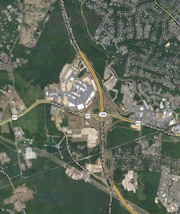About Bacon’s Rebellion
Bacon's Rebellion is Virginia's leading independent portal for news, opinions and analysis about state, regional and local public policy. Read more about us here.
Smart Growth for Conservatives
Smart growth is too important to leave to liberals. Conservatives must articulate their own vision for creating prosperous, livable and fiscally sustainable communities.
by James A. Bacon
Few aspects of government policy touch peoples' lives as profoundly as transportation and land use. The built environment exerts a tremendous influence upon the cost of transportation, housing, utilities and government services as well as quality of life and the environment. The "smart growth" movement has gained momentum in recent years as Americans have sought solutions to the problems arising from the dysfunctional land use patterns commonly referred to as suburban sprawl.
Liberals have spear-headed the critique of sprawl, to their credit, and they have largely defined Smart Growth. As is their wont, however, they frequently call for top-down solutions. There's no social problem that a good strong dose of government intervention won't fix! Allergic to calls for bigger, stronger, more coercive government -- herding people onto mass transit and into multi-family housing are the exaggerated images they react to -- conservatives have thrown out the smart-growth baby with the liberal bathwater.
Big mistake. There is nothing intrinsically liberal or conservative about the idea of creating more efficient human settlement patterns that expand the range of housing and transportation options while reducing the cost of government. Rather than getting stuck defending an indefensible status quo, conservatives need to articulate their own vision in a manner consistent with conservative principles.
 Conservatives! It's time to see the light. Smart Growth is too important to leave to liberals!
Conservatives! It's time to see the light. Smart Growth is too important to leave to liberals!
So, what conservative values are we talking about? Conservatism is a diverse movement, encompassing secular libertarians, religious evangelicals and Main Street businesses, but I think it's fair to say that most conservatives are dedicated to the following:
- Small government. Government should focus on a few core responsibilities and do them well. Government that governs the least governs the best.
- Low taxes. Some taxes are necessary to fund core government responsibilities but they pose a burden on citizens and, if too high, undermine economic growth.
- Reasonable regulation. Some regulation is necessary for the protection of the public health and safety. But regulations have unintended consequences and regulators tend to get captured or gamed by special interests. Generally speaking, regulations need to be rolled back.
- Strong property rights. A man's home is his castle. A property owner should be allowed to do what he/she wants with her property as long as it causes no harm to others. Property owners should be properly compensated for the loss of property rights.
- Distrust of elites. Most conservatives are of the live-and-let-live, don't-tread-on-me variety (some social issues excepted) and they distrust the social-engineering schemes of progressives intent upon "making the world a better place."
 Global warming. Society needs to make reasonable investments in clean water, clean air and habitat protection. But conservatives are highly skeptical about the proposed antidotes to Global Warming, a controversy they believe is ginned up by liberals looking for an excuse to re-order the world in their image.
Global warming. Society needs to make reasonable investments in clean water, clean air and habitat protection. But conservatives are highly skeptical about the proposed antidotes to Global Warming, a controversy they believe is ginned up by liberals looking for an excuse to re-order the world in their image.
Now, let's look at the public policies that have shaped land use since World War II and view them through the prism of conservative principles.
Land use codes. The underlying premise of zoning codes is that different land uses -- residential, retail and commercial -- should be rigidly segregated. Of course it makes sense to separate some land uses, in particular industrial activities that are excessively toxic, noisy, dusty or otherwise unpleasant. But for the most part, there is no rational reason for the codes. Most problems that stem from houses and businesses existing side by side can be resolved with nuisance codes.
 Zoning codes breed regulations and require a government planning apparatus to enforce them. They usurp the right of property owners to do what they want with their land, telling people what they can build and where. And they deprive consumers of choice. It's one thing to allow people to live in cul de sac subdivisions, work in office parks and shop in malls surrounded by vast parking lots. It's quite a different thing to require them to do so as a matter of code. The suburban status quo effectively bans the building of compact, walkable mixed use communities except when developers engage in a lengthy, expensive and risky process of petitioning for special permits. There is no basis in conservative thought for discriminating against neighborhoods where people can walk to the corner store, take the bus or live in an apartment above the shop or studio where they work. Indeed, the intellectual genesis for such controls can be traced to the progressive movement.
Zoning codes breed regulations and require a government planning apparatus to enforce them. They usurp the right of property owners to do what they want with their land, telling people what they can build and where. And they deprive consumers of choice. It's one thing to allow people to live in cul de sac subdivisions, work in office parks and shop in malls surrounded by vast parking lots. It's quite a different thing to require them to do so as a matter of code. The suburban status quo effectively bans the building of compact, walkable mixed use communities except when developers engage in a lengthy, expensive and risky process of petitioning for special permits. There is no basis in conservative thought for discriminating against neighborhoods where people can walk to the corner store, take the bus or live in an apartment above the shop or studio where they work. Indeed, the intellectual genesis for such controls can be traced to the progressive movement.
 Low densities. Many counties have imposed density limitations on new growth with the thought that they would limit the impact of development on roads and schools. But smearing 1,000 people over 1,000 acres of land is impossible to provide with roads, utilities and services as efficiently as if they were concentrated in 100 acres, or even 10 acres, of land. Fiscal conservatives should object to such inefficiency. And property rights advocates should object to the restrictions placed on what property owners can build on their land.
Low densities. Many counties have imposed density limitations on new growth with the thought that they would limit the impact of development on roads and schools. But smearing 1,000 people over 1,000 acres of land is impossible to provide with roads, utilities and services as efficiently as if they were concentrated in 100 acres, or even 10 acres, of land. Fiscal conservatives should object to such inefficiency. And property rights advocates should object to the restrictions placed on what property owners can build on their land.
There is one caveat here that is important for subsidy-loathing conservatives to bear in mind. While people should be free to build wherever they want, they have no claim to the full panoply of government services -- roads, water, sewer, schools, public safety, etc. -- in remote, inefficiently served locations at the same prices as those services are available to others. Property owners should bear the full location-variable costs of where they build.
 Leapfrog development. Leapfrog development makes human settlement patterns even more inefficient by scattering subdivisions, shopping centers and office parks across the countryside, leaving large holes in the urban fabric. Scatteration is more expensive to serve with roads, utilities and public services than compact development. This phenomenon, along with segregated land uses and density downzoning, drives up the cost of local government and transportation.
Leapfrog development. Leapfrog development makes human settlement patterns even more inefficient by scattering subdivisions, shopping centers and office parks across the countryside, leaving large holes in the urban fabric. Scatteration is more expensive to serve with roads, utilities and public services than compact development. This phenomenon, along with segregated land uses and density downzoning, drives up the cost of local government and transportation.
Why does leapfrog development occur? It is not the result of the "natural" workings of a free market. There are two driving forces. The first is the willingness of state and/or local local governments to subsidize the road improvements needed to serve them with public funds. A political economy has evolved in which developers and landowners contribute major sums to state and local elected politicians and then seek favors from them. This is the rent-seeking culture of Washington, D.C., writ small. The second arises from "anti-growth" politicians reacting to the rising cost of public services by restricting new development, even responsible development, in their jurisdictions. Developers then build projects in friendlier jurisdictions, typically farther from the urban core. Thus, the foes of sprawl in one county push it into another. Neither pro-developer subsidies nor anti-developer zoning restrictions should be palatable to conservatives.
 Parking mandates. Zoning codes mandate minimum parking requirements in an indiscriminate manner, as if homeowners, shopping center developers and employers couldn't judge for themselves how much parking they need. Because parking is mandated, property developers have no incentive to economize on space or to achieve synergies between land uses that experience peak parking demands during the day (offices) and the evening (residences). The result is a vast excess of mostly empty acreage devoted to parking. This parking is expensive, driving up the cost of development, and it pushes buildings farther apart at the expense of walkability. Parking mandates should be odious to every conservative who opposes unnecessary regulation.
Parking mandates. Zoning codes mandate minimum parking requirements in an indiscriminate manner, as if homeowners, shopping center developers and employers couldn't judge for themselves how much parking they need. Because parking is mandated, property developers have no incentive to economize on space or to achieve synergies between land uses that experience peak parking demands during the day (offices) and the evening (residences). The result is a vast excess of mostly empty acreage devoted to parking. This parking is expensive, driving up the cost of development, and it pushes buildings farther apart at the expense of walkability. Parking mandates should be odious to every conservative who opposes unnecessary regulation.
 Transit monopolies. Virtually every mass transit enterprise in the United States loses money, representing a drain go the taxpayer. One can argue that transit deserves its public subsidies because it provides public goods such as transporting poor people to work, reducing automobile emissions, and the like. But there is no avoiding the fact that, by private sector standards, transit companies are woefully inefficient.
Transit monopolies. Virtually every mass transit enterprise in the United States loses money, representing a drain go the taxpayer. One can argue that transit deserves its public subsidies because it provides public goods such as transporting poor people to work, reducing automobile emissions, and the like. But there is no avoiding the fact that, by private sector standards, transit companies are woefully inefficient.
First of all, they're monopolies, which are not known for their dedication to cost control or public service. Second, they're government-owned monopolies, which means that critical decisions on routes and fares are driven by politics, not economics. That's inefficiency squared. Not only do transit monopolies represent a drain on taxpayers but they limit competition and innovation, slowing the evolution to more cost-effective, consumer- responsive, privately owned transportation alternatives made possible by new technologies like GPS-equipped smart phones. State-owned monopolies fail almost every known test of conservative principles.
In summary, real estate and the transportation sector that serves it is one of the most heavily regulated and subsidized sectors of the American economy. Only health care, education and defense can compete in the degree to which government intrudes. Not surprisingly, like those sectors, real estate is among the most dysfunctional sectors of the American economy. Many conservatives perversely defend the institutional arrangements that have created contemporary suburbia, with its scattered, low-density, disconnected and car-dependent pattern of development. But that is a disastrous mistake. Conservatives need to systematically apply their principles to transportation and land use with the goal of creating smarter, more efficient patterns of growth.
So, what would conservative transportation and land use policies look like? In a short essay such as this, it is impossible to enumerate those policies in any detail. And, as the saying goes, the devil is in the details. Frankly, because conservatives have given so little thought to conservative smart growth, it's not always clear what those details are. An enormous amount of work remains to be done. The policies that follow are very broad brush-stroke and are meant mainly to stimulate thinking.
 Roll back government regulation of the real estate marketplace. The current regulatory regime puts developers in a straight jacket that allows no outcome other than segregated land uses. We need to roll back the regulations that outlaw mixed uses, and we need to re-think the low-density mandates. Unfortunately, reversing sprawl-inducing rules without inducing legal and political chaos may prove to be difficult. Perhaps the rollback could be accomplished piece-meal. Perhaps counties could introduce alternative "form-based codes" that accommodate mixed uses and allow higher densities but buffer homeowners from the prospect of a high-rise being built next door. One way or another, we need to give developers more freedom to recycle outdated, auto-centric subdivisions and shopping centers into walkable, mixed use communities without enduring lengthy and risky zoning petitions when market conditions permit.
Roll back government regulation of the real estate marketplace. The current regulatory regime puts developers in a straight jacket that allows no outcome other than segregated land uses. We need to roll back the regulations that outlaw mixed uses, and we need to re-think the low-density mandates. Unfortunately, reversing sprawl-inducing rules without inducing legal and political chaos may prove to be difficult. Perhaps the rollback could be accomplished piece-meal. Perhaps counties could introduce alternative "form-based codes" that accommodate mixed uses and allow higher densities but buffer homeowners from the prospect of a high-rise being built next door. One way or another, we need to give developers more freedom to recycle outdated, auto-centric subdivisions and shopping centers into walkable, mixed use communities without enduring lengthy and risky zoning petitions when market conditions permit.
 Restore homeowner property rights. Upon what philosophical principle does government prohibit individual landowners from adapting their single-family dwellings into properties that include income-producing garage apartments or granny flats? If Neighbor A fears that Neighbor B's leasing out the basement to a college student will lower property values, should that fear trump the right of Neighor B to do what he wishes with his property? Think of all the homeowners these days who are having difficulty paying their mortgages. Why shouldn't they have the freedom to make ends meet by taking in a roommate or converting the basement into an apartment? Think of all the people who have difficulty finding affordable housing. Why should they be forced to seek shelter in apartments that they can't afford or neighborhoods they don't want to live in?
Restore homeowner property rights. Upon what philosophical principle does government prohibit individual landowners from adapting their single-family dwellings into properties that include income-producing garage apartments or granny flats? If Neighbor A fears that Neighbor B's leasing out the basement to a college student will lower property values, should that fear trump the right of Neighor B to do what he wishes with his property? Think of all the homeowners these days who are having difficulty paying their mortgages. Why shouldn't they have the freedom to make ends meet by taking in a roommate or converting the basement into an apartment? Think of all the people who have difficulty finding affordable housing. Why should they be forced to seek shelter in apartments that they can't afford or neighborhoods they don't want to live in?
 Encourage innovation in real estate development. Have county zoning codes reached such a state of timeless perfection that they should dictate land uses for all time? Are planners so omnipotent that they accurately predict the market demand for housing and business space in a dynamic economy for years in the future? Not bloody likely. Governments should unleash entrepreneurs by giving them more freedom. Let the marketplace, not comprehensive plans, decide what gets built and where.
Encourage innovation in real estate development. Have county zoning codes reached such a state of timeless perfection that they should dictate land uses for all time? Are planners so omnipotent that they accurately predict the market demand for housing and business space in a dynamic economy for years in the future? Not bloody likely. Governments should unleash entrepreneurs by giving them more freedom. Let the marketplace, not comprehensive plans, decide what gets built and where.
 Deregulate mass transit. Municipal transit monopolies and taxicab oligopolies are economic dinosaurs. Taxicabs and municipal bus services following fixed routes on fixed schedules have changed little since the 1940s. The IT revolution is revolutionizing transportation services just like it's transforming every other sector of the economy. The ability to track vehicles and riders by the GPS feature in their smart phones opens up possibilities for transportation services that no one could have imagined only four or five years ago. Governments should stop propping up failed, money-losing enterprises and clear space for the transportation innovators. The future will look a lot less like Yellow Taxicab and the city bus line and a lot more like Megabus, ZipCar, Uber and Jamaican jitneys.
Deregulate mass transit. Municipal transit monopolies and taxicab oligopolies are economic dinosaurs. Taxicabs and municipal bus services following fixed routes on fixed schedules have changed little since the 1940s. The IT revolution is revolutionizing transportation services just like it's transforming every other sector of the economy. The ability to track vehicles and riders by the GPS feature in their smart phones opens up possibilities for transportation services that no one could have imagined only four or five years ago. Governments should stop propping up failed, money-losing enterprises and clear space for the transportation innovators. The future will look a lot less like Yellow Taxicab and the city bus line and a lot more like Megabus, ZipCar, Uber and Jamaican jitneys.
 Make growth pay its own way. Conservatives should embrace the principle that people and enterprises should be free to build what they want where they want as long as they do not cause harm to others -- but they are not entitled to an unlimited claim on the taxpayer to fund the extension of utilities and public services to remote or inefficiently served locations.
Make growth pay its own way. Conservatives should embrace the principle that people and enterprises should be free to build what they want where they want as long as they do not cause harm to others -- but they are not entitled to an unlimited claim on the taxpayer to fund the extension of utilities and public services to remote or inefficiently served locations.
Putting this principle into action undoubtedly will prove to be tricky in practice, and I don't propose to have all the answers on how to do it. In general terms, however, I see it working like this: Cities and counties should levy an impact fee upon new houses, shopping centers and office buildings to cover the up-front capital cost of adding new schools, water-and-sewer capacity, public safety buildings and the like. The charge would vary, depending upon the location. If there is existing, under-utilized infrastructure in an old neighborhood, there might be no fee at all. If the location sits inside an officially designated service district, the fee would cover pro-rata costs. If the location is expensive to serve, the fee would be higher. The aim of the jurisdiction should not be to encourage or discourage growth and development, but to ensure that growth covers the cost of providing public services.
 Adopt user pays transportation. Conservatives must stop subsdizing the auto-centric lifestyles of their rural and suburban constituents. The automobile is only one transportation mode among many, and there is no philosophical justification for favoring cars over buses, bicycles, vans, Segways or other ways of getting around. (Indeed, insofar as automobiles cause pollution and perpetuate dependence upon foreign oil, there are philosophical justifications for discouraging automobile use.) Once upon a time, the motor fuels tax functioned as a user fee that covered most of the expense associated with roads and highways. But many so-called conservatives refuse to raise the gas tax on the grounds that it is a "tax," and all taxes are equally bad, even though they seek to subsidize roads with all manner of other taxes, fees and charges that bear no relation to how much a person drives and the demand he places on the transportation system. By artificially reducing the cost of driving, ironically, such tax policies encourage people to drive more -- which aggravates the traffic congestion the taxes are meant to address.
Adopt user pays transportation. Conservatives must stop subsdizing the auto-centric lifestyles of their rural and suburban constituents. The automobile is only one transportation mode among many, and there is no philosophical justification for favoring cars over buses, bicycles, vans, Segways or other ways of getting around. (Indeed, insofar as automobiles cause pollution and perpetuate dependence upon foreign oil, there are philosophical justifications for discouraging automobile use.) Once upon a time, the motor fuels tax functioned as a user fee that covered most of the expense associated with roads and highways. But many so-called conservatives refuse to raise the gas tax on the grounds that it is a "tax," and all taxes are equally bad, even though they seek to subsidize roads with all manner of other taxes, fees and charges that bear no relation to how much a person drives and the demand he places on the transportation system. By artificially reducing the cost of driving, ironically, such tax policies encourage people to drive more -- which aggravates the traffic congestion the taxes are meant to address.
Transportation funding should be restructured to function as a user/benefit pays system. Those who use the system contribute to it in direct proportion to their use. Those who benefit from the system -- primarily landowners whose property values increase when transportation access is improved -- should contribute to the cost of construction. Between tolls, gasoline taxes, proffers, impact fees and special tax districts, there are ample means to fund new transportation improvements.
Prioritize by ROI. Currently, transportation dollars are distributed according to ideological and political considerations. Roads, mass transit and other transportation projects should be funded on the basis of how much they ameliorate congestion, improve safety, reduce pollution and create jobs (as opposed to shifting jobs from one location to another). The cost should be compared to the benefits, and the projects ranked according to a Return on Investment basis. Money should flow to the projects offering the highest rate of return.
Follow these general prescriptions and you'll end up with conservative Smart Growth. It will resemble liberal Smart Growth in shifting growth and development from "suburban sprawl" toward more compact, walkable, mixed-use communities to the extent that such communities are demanded by the public. There will be fewer transportation subsidies and more transportation innovation. There will be fewer roads to nowhere that open up land for greenfield development, and there will be more re-development of aging neighborhoods, shopping centers and office parks that utilize existing infrastructure. The great difference between the conservative and liberal visions is that is that growth and development under conservative principles will be propelled by entrepreneurs and consumers in a freer market, bubbling from the bottom up, not imposed top-down by politicians, planners and elites upon a reluctant populace.
This essay has been adapted from a speech delivered at the 2012 Congress for the New Urbanism.

